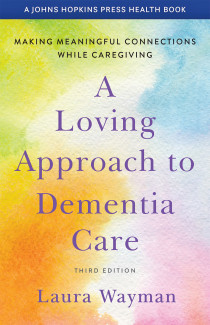
Johns Hopkins UniversityEst. 1876
America’s First Research University
Now Browsing:
Shining A Light Into the Darkness of Dementia Through Support, Encouragement, and Hope

All caregivers have defining moments in their journey that open their minds and hearts to dementia. For me, that was experiencing the tragic story of the caregiver, Peggy.
Because she was dutifully doing what she had always done, loving her husband through sickness in health, she never opened up to others about just how much care her husband Jack was receiving. As is true with many caregivers, she received many offers of help throughout the years from family, neighbors, and friends, but never accepted it. Eventually, her life ended as a result.
Her story hits home and I carry it in my heart because Peggy was my mother and was caring for my father, Jack. While I often think about how I wish I could have reached Peggy before it was too late, she continues to be my gentle teacher and an ever-present reminder that selfless caregivers will take on too much, sometimes to honor vows or feelings of responsibility, often pushing beyond their own capabilities until it’s too late.
This personal experience ignited my passion for educating all caregivers on the importance of caring for themselves first while developing “dementia awareness” that allows them to navigate dementia with an open mind and heart. With the third edition of my book, A Loving Approach to Dementia Care, launching spring 2021, I can travel the journey of caregiving along with readers while shining a bright light into the darkness of dementia through support, encouragement, and hope.
It was during the writing and research process for the first edition of the book that I was met with the stark reality of how many myths and misperceptions there are surrounding dementia care – what it is and how it affects those living with symptoms. We are woefully behind in providing caregivers, both family and professional, tools and strategies that can help take them across the finish line in what I call the “dementia-care marathon.”

For the dementia-challenged adult, basic activities of daily living (ADLs) such as bathing, toileting, and dressing become hard to manage. Many of these caregivers get so immersed in these endless daily tasks that they lose touch with how significant their role is, which, over time, can lead to feelings of burnout and resentment. This can put quite the strain on relationships, especially when loved ones live in a state of denial about their new reality.
Nobody wants a loved one to have dementia, but caregivers are particularly vulnerable to a kind of denial that is often based on self-protection. While it may feel safe to pretend things are “fine” or “normal,” this becomes very dangerous as they often let loved ones make risky decisions such as driving or overseeing financial decisions. Critical time passes when systems should be put in place to protect against many kinds of potentially dangerous behaviors, and this often results in disaster the longer it goes unchecked. “Dementia awareness,” the antidote to denial, is the loving act of seeking out education about dementia to understand the symptoms, causes, and tools to adapt and respond. Operating from a place of acceptance, a dementia-aware caregiver seeks help so that he or she has sustained energy and resilience during this marathon.
The new edition of my book offers many practical tips and compassionate resources for both family and professional caregivers to achieve dementia awareness and incorporate it into caregiving. However, it is so much more than simply a guide to caregiving. It is a support system written with deep empathy for families, health professionals and everyday community members who are all profoundly impacted by dementia.
Each chapter contains two usable sections, “Lessons Learned” and “Perceptions and Approaches,” which provide applicable strategies for most of the challenges and difficulties caregivers are facing or will soon face, illustrated by true stories. I share ways to navigate them that will leave readers feeling empowered, hopeful, and inspired in a time where they are most likely feeling exactly the opposite. Many caregivers who have read the first and second editions have shared that they keep their copy close by, referring to the information as they experience the situations.
The need to raise dementia-awareness is so widespread within not just long-term care, but throughout entire communities for all first responders, doctors, nurses, hospice, home health, and all community members. This book has valuable takeaways for everyone in every walk of life who is either impacted by dementia now or will be in the future.
Order the third edition of A Loving Approach to Dementia Care: Making Meaningful Connections while Caregiving at the following link: https://jhupbooks.press.jhu.edu/title/loving-approach-dementia-care
Laura Wayman is a professional dementia care consultant who holds an associate in arts degree in gerontology and is a certified Social Services Designee. The CEO of The Dementia Whisperers, Wayman has over a decade of experience in and a strong dedication to quality aging, and she is a sought-after speaker on dementia and issues of aging. She is the author of A Loving Approach to Dementia Care: Making Meaningful Connections while Caregiving.

Because she was dutifully doing what she had always done, loving her husband through sickness in health, she never opened up to others about just how much care her husband Jack was receiving. As is true with many caregivers, she received many offers of help throughout the years from family, neighbors, and friends, but never accepted it. Eventually, her life ended as a result.
Her story hits home and I carry it in my heart because Peggy was my mother and was caring for my father, Jack. While I often think about how I wish I could have reached Peggy before it was too late, she continues to be my gentle teacher and an ever-present reminder that selfless caregivers will take on too much, sometimes to honor vows or feelings of responsibility, often pushing beyond their own capabilities until it’s too late.
This personal experience ignited my passion for educating all caregivers on the importance of caring for themselves first while developing “dementia awareness” that allows them to navigate dementia with an open mind and heart. With the third edition of my book, A Loving Approach to Dementia Care, launching spring 2021, I can travel the journey of caregiving along with readers while shining a bright light into the darkness of dementia through support, encouragement, and hope.
It was during the writing and research process for the first edition of the book that I was met with the stark reality of how many myths and misperceptions there are surrounding dementia care – what it is and how it affects those living with symptoms. We are woefully behind in providing caregivers, both family and professional, tools and strategies that can help take them across the finish line in what I call the “dementia-care marathon.”

For the dementia-challenged adult, basic activities of daily living (ADLs) such as bathing, toileting, and dressing become hard to manage. Many of these caregivers get so immersed in these endless daily tasks that they lose touch with how significant their role is, which, over time, can lead to feelings of burnout and resentment. This can put quite the strain on relationships, especially when loved ones live in a state of denial about their new reality.
Nobody wants a loved one to have dementia, but caregivers are particularly vulnerable to a kind of denial that is often based on self-protection. While it may feel safe to pretend things are “fine” or “normal,” this becomes very dangerous as they often let loved ones make risky decisions such as driving or overseeing financial decisions. Critical time passes when systems should be put in place to protect against many kinds of potentially dangerous behaviors, and this often results in disaster the longer it goes unchecked. “Dementia awareness,” the antidote to denial, is the loving act of seeking out education about dementia to understand the symptoms, causes, and tools to adapt and respond. Operating from a place of acceptance, a dementia-aware caregiver seeks help so that he or she has sustained energy and resilience during this marathon.
The new edition of my book offers many practical tips and compassionate resources for both family and professional caregivers to achieve dementia awareness and incorporate it into caregiving. However, it is so much more than simply a guide to caregiving. It is a support system written with deep empathy for families, health professionals and everyday community members who are all profoundly impacted by dementia.
Each chapter contains two usable sections, “Lessons Learned” and “Perceptions and Approaches,” which provide applicable strategies for most of the challenges and difficulties caregivers are facing or will soon face, illustrated by true stories. I share ways to navigate them that will leave readers feeling empowered, hopeful, and inspired in a time where they are most likely feeling exactly the opposite. Many caregivers who have read the first and second editions have shared that they keep their copy close by, referring to the information as they experience the situations.
The need to raise dementia-awareness is so widespread within not just long-term care, but throughout entire communities for all first responders, doctors, nurses, hospice, home health, and all community members. This book has valuable takeaways for everyone in every walk of life who is either impacted by dementia now or will be in the future.
Order the third edition of A Loving Approach to Dementia Care: Making Meaningful Connections while Caregiving at the following link: https://jhupbooks.press.jhu.edu/title/loving-approach-dementia-care
Laura Wayman is a professional dementia care consultant who holds an associate in arts degree in gerontology and is a certified Social Services Designee. The CEO of The Dementia Whisperers, Wayman has over a decade of experience in and a strong dedication to quality aging, and she is a sought-after speaker on dementia and issues of aging. She is the author of A Loving Approach to Dementia Care: Making Meaningful Connections while Caregiving.

Login to View & Leave Comments
Login to View & Leave Comments

